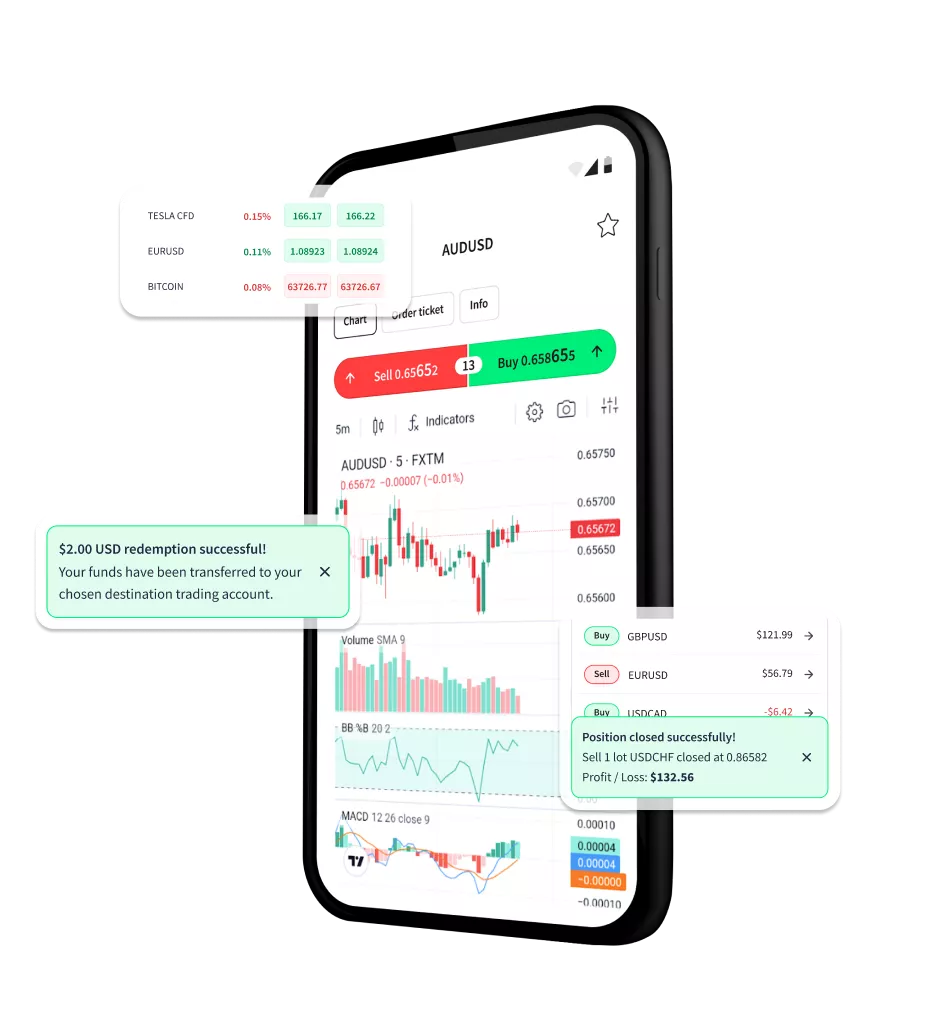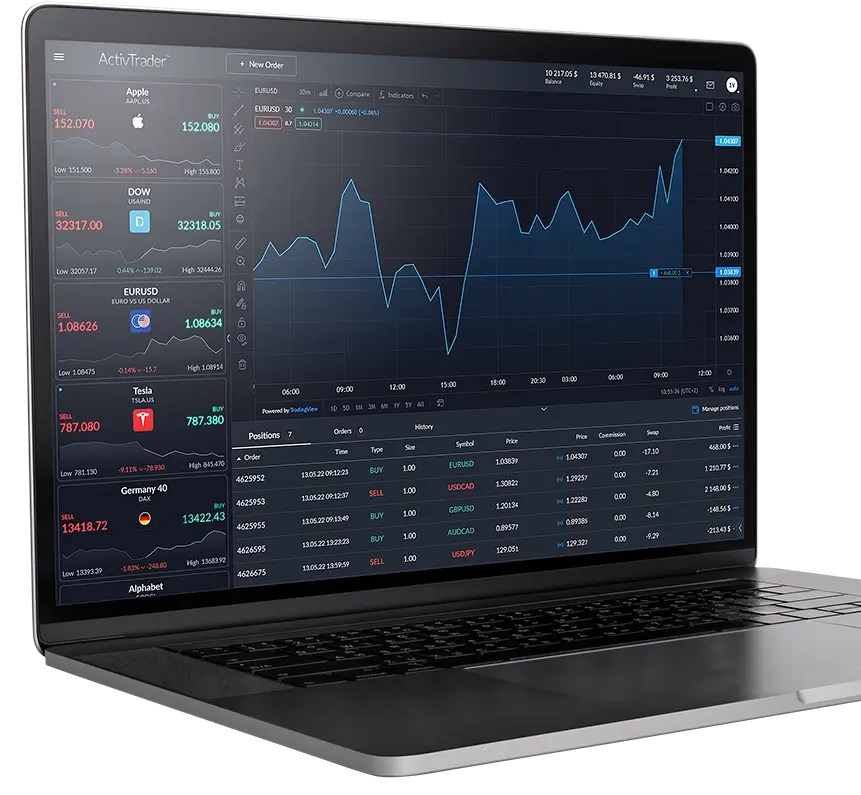What Is Forex Trading?
Forex trading, short for “foreign exchange,” involves buying one currency while selling another. The goal is to profit from fluctuations in currency values. Trades are conducted in pairs, such as EUR/USD or GBP/JPY, where the first currency is called the base and the second is the quote.
The forex market operates 24 hours a day, five days a week, across global financial centers. This constant activity allows participants to react to economic news, political events, and market trends in real time.
Main characteristics of forex trading include:
- High liquidity: Daily volumes often exceed $7 trillion, making forex the most active market globally.
- Accessibility: Many brokers allow small deposits, enabling newcomers to start with limited capital.
- Leverage: Traders can open larger positions than their account balance, though this also increases risk.
- Diverse instruments: Besides currency pairs, many brokers offer CFDs on metals, indices, and cryptocurrencies.
The key for beginners is understanding that forex trading combines opportunity with risk. Without knowledge of how price movements work or how leverage impacts outcomes, losses can occur as easily as gains.

Key Features to Consider When Choosing a Forex Broker for Beginners
Selecting a reliable broker determines how smooth the first trading experience will be. A solid broker helps users focus on learning strategies instead of solving platform issues or dealing with unclear pricing. When evaluating options, beginners should analyze several practical aspects.
Regulation and Licensing
Regulation is the foundation of safety in forex. Brokers supervised by recognized authorities such as the FCA (UK), CySEC (Cyprus), or ASIC (Australia) must meet strict operational and capital standards. This ensures that client funds are held separately from company accounts and that transparent reporting practices are followed.
| Regulator | Region | Example of Licensed Brokers |
|---|---|---|
| FCA | United Kingdom | IG, Pepperstone |
| CySEC | Cyprus | XM, FXTM |
| ASIC | Australia | Pepperstone, AvaTrade |
Minimum Deposit and Account Types
Some brokers let traders open accounts with as little as $10, while others require $200 or more. Flexible account types—like standard, micro, or demo accounts—help beginners test strategies before risking real funds.
| Account Type | Typical Deposit | Suitable For |
|---|---|---|
| Demo | $0 | Practice and strategy testing |
| Micro | $10–$100 | Low-risk real trading |
| Standard | $100–$500 | Broader market access |
Trading Costs and Spreads
Tight spreads and low commissions help maintain profitability. Beginners often underestimate how small price differences can accumulate over time. Comparing brokers’ average spreads for major pairs such as EUR/USD or GBP/USD is crucial.
Platform Usability
User-friendly interfaces reduce learning time. Platforms like MetaTrader 4 and MetaTrader 5 are widely supported, offering simple navigation, technical indicators, and automated trading capabilities.
Educational Material and Market Analysis
A good broker should invest in the trader’s growth. Tutorials, webinars, and beginner courses explain essential concepts—like risk management or reading candlestick charts—without using complex jargon.
Customer Service and Language Support
Responsive assistance in multiple languages can be essential, especially for beginners from non-English-speaking regions. Live chat and email support during trading hours make a significant difference when technical or financial issues arise.
Top Forex Brokers for Beginners in 2026
In 2026, the forex market offers dozens of reliable brokers, but not all are equally suitable for new traders. The most beginner-friendly platforms combine intuitive design, strong regulation, transparent fees, and educational materials that simplify the learning curve. Below are seven of the best-rated brokers for those starting their trading journey this year.
| Commision | Instruments | Min Dep | Leverage | Platforms | ||
|---|---|---|---|---|---|---|
| Spread-only, from 0.6 pips | Indices Forex Commodities | $250 | 1:200 | MT4 proprietary | ||
| From $5 per lot | Forex Commodities Indices Crypto | $100 | Up to 1:400 | AvaTradeGo MT4 MT5 | ||
| No commission, spreads from 0.6 pips | Forex Stocks Commodities Indices | $5 | Up to 1:1000 | MT4 MT5 | ||
| No commission, spreads from 0.0 pips | Forex Commodities Indices Crypto | $200 | Up to 1:500 | MT4 MT5 cTrader | ||
| No commission, spreads from 0.1 pips | Forex Commodities Indices Crypto | $10 | Up to 1:2000 | MT4 MT5 | ||
| No commission, tight spreads | Forex Commodities Indices | $0 | Up to 1:50 | OANDA App Web |
IG
IG
IG is one of the oldest and most trusted forex brokers globally, known for its transparent pricing and advanced charting tools. Despite its professional infrastructure, the platform remains easy to navigate for newcomers.
Advantages:
- Regulation: FCA (UK), BaFin (Germany), ASIC (Australia).
- Minimum deposit: $0 (bank transfer).
- Spreads: From 0.6 pips on major pairs.
- Education: IG Academy offers interactive courses for traders of all levels.
AvaTrade
AvaTrade
AvaTrade provides a balanced environment for both new and intermediate traders. It focuses on educational tools, fixed spreads, and a solid mobile app experience.
Main strengths:
- Regulation: ASIC, FSCA, CySEC, and others.
- Minimum deposit: $100.
- Available assets: Forex pairs, commodities, indices, and cryptocurrencies.
- Platform choice: MT4, MT5, and AvaTradeGO.
XM
XM
XM is known for fast order execution and low minimum deposits. It also offers extensive educational resources in multiple languages.
Key characteristics:
- Regulation: ASIC, CySEC, IFSC.
- Minimum deposit: $5.
- Leverage: Up to 1:1000 for eligible clients.
- Instruments: Forex, CFDs on commodities, indices, and stocks.
Pepperstone
Pepperstone
Pepperstone is widely recognized for its low spreads and powerful execution technology. It appeals to traders who appreciate both cost efficiency and strong support.
Key aspects:
- Regulation: FCA, ASIC, DFSA.
- Minimum deposit: Around $200.
- Spreads: From 0.0 pips on Razor accounts.
- Platforms: MT4, MT5, and cTrader.
FXTM
FXTM
FXTM (ForexTime) focuses on education and local accessibility. It offers webinars, analytical articles, and free demo accounts suitable for learning.
Highlights:
- Regulation: FCA, CySEC, FSCA.
- Minimum deposit: From $10.
- Leverage: Up to 1:2000 (varies by region).
- Assets: Forex, CFDs, metals, and shares.
OANDA
OANDA
OANDA combines a strong regulatory background with excellent analytical tools and fair pricing. It’s suitable for traders who want flexibility and transparent trading conditions.
Notable features:
- Regulation: CFTC (US), FCA (UK), ASIC (Australia).
- Minimum deposit: No fixed requirement.
- Spreads: Variable, starting from 0.8 pips.
- Platforms: MT4 and OANDA Trade.
Trading Platforms: MT4 and MT5 Overview
Trading platforms are the tools through which traders analyze charts, open positions, and manage their accounts. The most popular options in the forex market remain MetaTrader 4 (MT4) and MetaTrader 5 (MT5). Both are developed by MetaQuotes Software and are supported by nearly every major broker mentioned earlier.
MetaTrader 4 (MT4)
MT4 has been the industry standard since 2005. It’s appreciated for its simplicity and efficiency. The platform provides a wide selection of built-in indicators, charting tools, and support for automated trading via Expert Advisors (EAs).
Main features of MT4:
- Compatible with most operating systems, including Windows, macOS, and mobile devices.
- Over 30 technical indicators and customizable chart templates.
- One-click trading and order management tools.
- Secure connection with brokers using encrypted data.
MetaTrader 5 (MT5)
MT5 is a more advanced version designed for multi-asset trading. It offers faster execution, more order types, and improved analytical capabilities compared to MT4.
Key advantages of MT5:
- Supports more asset classes, including stocks, commodities, and futures.
- Provides 21 timeframes versus MT4’s 9, giving greater flexibility in analysis.
- Integrated economic calendar and depth-of-market data.
- Optimized algorithmic trading with the MQL5 programming language.
What Are CFDs and How Do They Work in Forex Trading?
CFDs, or Contracts for Difference, allow traders to speculate on the price movement of financial instruments without owning the underlying asset. In forex, this means trading currency pairs based on their price changes rather than physical exchange.

When a trader opens a CFD position, they agree to exchange the difference between the entry and exit prices of a currency pair. Profits or losses depend solely on the direction of the price movement.
Example: A trader opens a CFD to buy EUR/USD at 1.0800. If the price rises to 1.0850, the 50-pip difference becomes profit. If the price falls to 1.0750, it results in a 50-pip loss.
Main characteristics of CFDs in forex trading:
- Leverage: Traders can control larger positions with smaller capital.
- Bid and ask pricing: Each trade involves a small spread between buying and selling prices.
- No ownership: Traders don’t actually hold currencies; they speculate on movements.
- Short and long positions: Traders can profit in both rising and falling markets.
Copy Trading: A Useful Tool for New Traders
Copy trading allows beginners to replicate trades from experienced investors automatically. This feature connects one’s trading account to that of another trader, mirroring their strategies in real time. It’s a way to participate in the market while learning from others’ decisions.
How copy trading works:
- A trader selects a signal provider or professional to follow.
- The system automatically copies the chosen trader’s actions proportionally to the follower’s balance.
- Profits and losses are reflected in both accounts based on trade outcomes.
Advantages for beginners:
- Learning practical strategies by observing real trades.
- Saving time on market analysis.
- Reducing emotional decision-making through automated execution.
Popular brokers offering copy trading:
- AvaTrade: Provides AvaSocial and DupliTrade for strategy copying.
- FXTM: Offers FXTM Invest, ideal for beginners.
- Pepperstone: Integrates Myfxbook AutoTrade and MetaTrader Signals.
Frequently Asked Questions
What is the minimum amount required to start forex trading?
It varies by broker, but most beginner-friendly platforms allow starting with $10–$100. However, using a demo account first is highly recommended.





